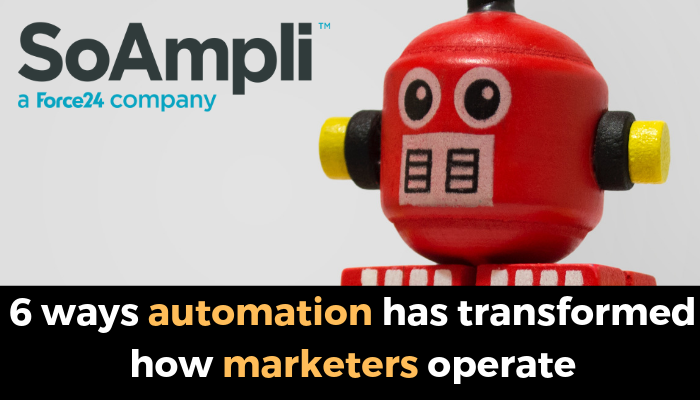Marketing automation isn’t a new concept in a digitally-led world, but there are still some who might be reluctant when considering it for their organisation.
There’s no denying that a modern marketing department looks very different to what it might’ve been 10, 20 years – or even 12 months – ago.
Digital transformation is having a huge impact on how companies are running, but that doesn’t mean tech will put creative marketers out of a job, or that firms have to pay over the odds to get the right system in place.
In fact, automation can offer the exact opposite. A GDPR-compliant piece of technology helps teams to become more cost-effective and time-savvy when streamlining their processes so they send out relevant comms that are personalised – with just a few clicks.
Shrewd marketing teams should be open to becoming more reliant upon smart technology to help alleviate their workloads when it comes to CRM, database management, lead generation, digital advertising, and more – rather than fearing them.
But how has automation transformed the ways in which businesses – and their comms departments – now operate.
1. It gets the right message to the best targets
With thousands of pieces of content being sent every second of the day, it’s so easy for customers to be instantly put off – especially when they receive something that’s more ‘noise’ than thought-provoking.
Therefore, achieving that all-important cut-through is vital – and a huge challenge for organisations to master – because they have to understand exactly how to get their message heard.
Marketers must go back to basics to achieve the ‘holy grail’ of comms landing perfectly – they have to create clear and consistent content that’s relevant to their desired target market. And, by delivering pertinent and simplistic messages, these have a far greater chance of sticking in the minds of potential customers.
Automation enables teams to utilise its powers to test, learn and optimise. By having real-time stats, businesses can refine content based on reach and engagement results – and feedback such crucial information to the sales and content team.
Ensuring the social post is engaging – or email copy is informative – and the content length and tone are familiar to a customer, as well as being sent out at the preferred times, means marketers are more likely to get the right message to the very best targets.
2. Activating social selling
All about building connections with prospects and leads, social selling is a crucial tool in which marketing automation can play a huge role.
Social selling is about providing meaningful resources that let them know they can come to you for anything – whether information on products, details on industry trends or other pieces of knowledge that they will find useful.
Social sellers can attract 45% more opportunities because they capitalise on consumer buying habits, they understand their audience on social media, and they use automated services to help reach them at the right times.
3. Offering a multi-channel approach
The great thing here is, marketers can understand which channel the customer actually prefers thanks to a smart tech solution. Is it email, SMS, direct mail, social media? Automation can certainly help with the answers.
Understanding channel preference allows firms to make comms slicker, quicker, smarter and easier when creating seamless, engaging conversation.
It also means that companies have multiple opportunities to interact with new business and existing customers for a fully integrated approach. So, if an email gets lost, GDPR-compliant automation can ensure another form of engagement is sent, to keep the relationship alive.
It’s important too, for marketers to consistently investigate the channels they’re using in order to send out the best, shareable, and valuable content to help increase sales and – ultimately – their ROI.
4. Personalisation
Most organisations understand the power of well-worked, targeted content – but there are still so many opportunities ignored. Why? Because it’s not always easy to perfectly land every single post or piece of information. Time-conscious marketers might also believe it takes too long, or think that all they need to do is send an email and address it to a customer’s first name.
However, it’s about much more than that – and here’s where automation plays a vital role. Using analytics to understand what time and format a contact is most responsive, and by looking into previous behaviours, for example, can have a huge impact.
Knowing a customer’s quirks by asking the right questions and filling in the gaps, can help to really home in on personalised comms – and save marketers crucial hours they simply don’t have.
5. Helping internal resources
And, that point brings us nicely onto how much of an impact automation can have on an entire workforce.
Think about it, having a system that allows marketers to pull together content and use it to distribute the correct messages – at the right times – means employees are able to get on with other pressing tasks.
This time can be used to conduct more analysis so marketers truly understand who they are speaking to – and what customers want in order to enhance their lives.
Not only that, smart tech can save costs too because it means teams become savvier with their productivity, and therefore generate more valuable content as a result. Check out the work Force24 does with its smart platform to send out supercharged comms.
6. Generating employee advocacy
Staff members have a huge role to play in how successful a business communicates with prospects along with lead generation.
They possess the skills, industry and company knowledge to help drive content and create a trusting voice within their sector – that means customers get the insight they’re looking for.
It’s becoming more apparent that brand messaging is getting overlooked in favour of what an employee is saying because, quite simply, people buy from people.
Therefore, having marketing automation in place allows employees to create – and distribute – the content that customers want to hear. They want an authentic and expert view on a topic, and staff-driven information can influence that.
In addition, what’s better for a firm than a happy, valued workforce? So, use smart tech to empower teams, and their content.
Overall, marketers and organisations have to think carefully about what automation can do for them – and what needs it can meet – before choosing a vendor. If it’s data for example, the best fit is a solution that’s intuitive and easy to use.
And – in a world driven by digital methods – it’s easy to get lost in the mire of what technology can benefit a company. Therefore, be prepared to take the time to look for a partner that is skilled in the customer journey – and which isn’t afraid to help deepen relationships with key targets.







